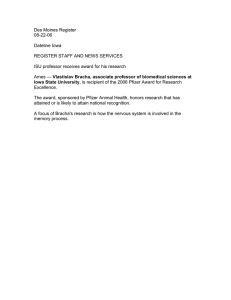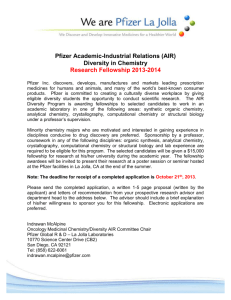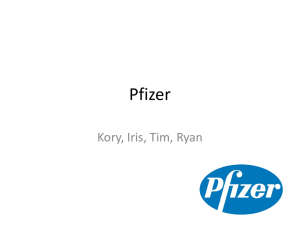Corporate Responsibility
advertisement
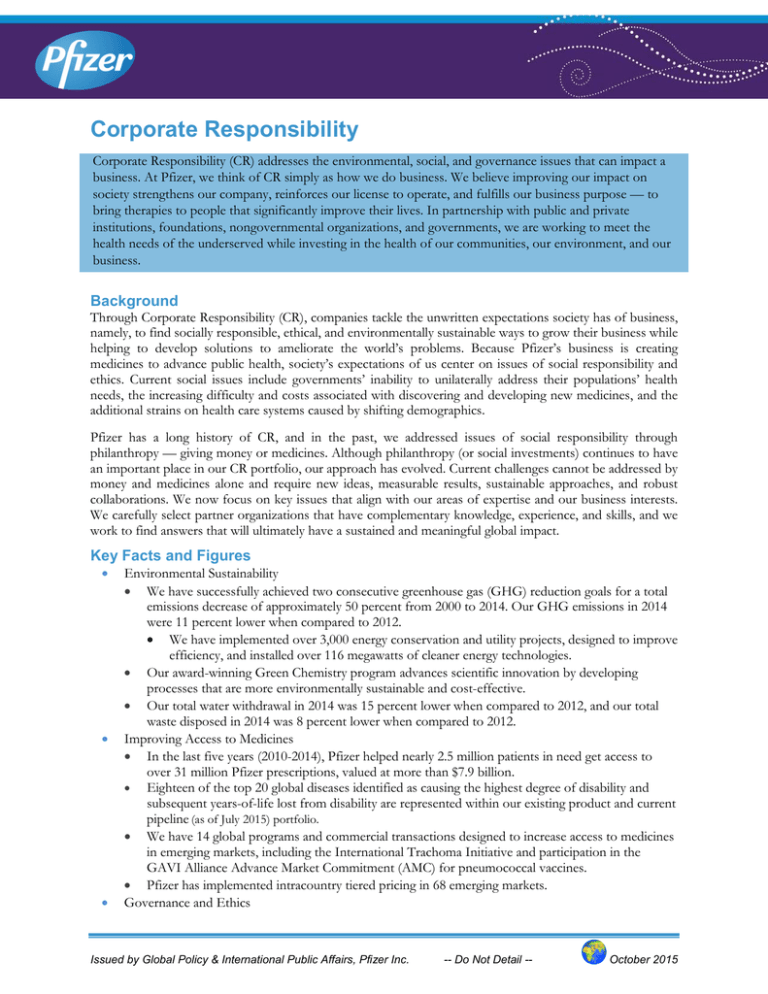
Corporate Responsibility Corporate Responsibility (CR) addresses the environmental, social, and governance issues that can impact a business. At Pfizer, we think of CR simply as how we do business. We believe improving our impact on society strengthens our company, reinforces our license to operate, and fulfills our business purpose — to bring therapies to people that significantly improve their lives. In partnership with public and private institutions, foundations, nongovernmental organizations, and governments, we are working to meet the health needs of the underserved while investing in the health of our communities, our environment, and our business. Background Through Corporate Responsibility (CR), companies tackle the unwritten expectations society has of business, namely, to find socially responsible, ethical, and environmentally sustainable ways to grow their business while helping to develop solutions to ameliorate the world’s problems. Because Pfizer’s business is creating medicines to advance public health, society’s expectations of us center on issues of social responsibility and ethics. Current social issues include governments’ inability to unilaterally address their populations’ health needs, the increasing difficulty and costs associated with discovering and developing new medicines, and the additional strains on health care systems caused by shifting demographics. Pfizer has a long history of CR, and in the past, we addressed issues of social responsibility through philanthropy — giving money or medicines. Although philanthropy (or social investments) continues to have an important place in our CR portfolio, our approach has evolved. Current challenges cannot be addressed by money and medicines alone and require new ideas, measurable results, sustainable approaches, and robust collaborations. We now focus on key issues that align with our areas of expertise and our business interests. We carefully select partner organizations that have complementary knowledge, experience, and skills, and we work to find answers that will ultimately have a sustained and meaningful global impact. Key Facts and Figures • • • Environmental Sustainability • We have successfully achieved two consecutive greenhouse gas (GHG) reduction goals for a total emissions decrease of approximately 50 percent from 2000 to 2014. Our GHG emissions in 2014 were 11 percent lower when compared to 2012. • We have implemented over 3,000 energy conservation and utility projects, designed to improve efficiency, and installed over 116 megawatts of cleaner energy technologies. • Our award-winning Green Chemistry program advances scientific innovation by developing processes that are more environmentally sustainable and cost-effective. • Our total water withdrawal in 2014 was 15 percent lower when compared to 2012, and our total waste disposed in 2014 was 8 percent lower when compared to 2012. Improving Access to Medicines • In the last five years (2010-2014), Pfizer helped nearly 2.5 million patients in need get access to over 31 million Pfizer prescriptions, valued at more than $7.9 billion. • Eighteen of the top 20 global diseases identified as causing the highest degree of disability and subsequent years-of-life lost from disability are represented within our existing product and current pipeline (as of July 2015) portfolio. • We have 14 global programs and commercial transactions designed to increase access to medicines in emerging markets, including the International Trachoma Initiative and participation in the GAVI Alliance Advance Market Commitment (AMC) for pneumococcal vaccines. • Pfizer has implemented intracountry tiered pricing in 68 emerging markets. Governance and Ethics Issued by Global Policy & International Public Affairs, Pfizer Inc. -- Do Not Detail -- October 2015 • • We are committed to good corporate governance and transparency, recognizing that both are essential to our ability to be a trusted member of society. Pfizer was the first U.S. company to establish a corporate governance department.1 The department has operated continuously since 1992. Pfizer’s Position One of the key issues for our business is the ability of patients to have access to our medicines. We work to ensure that our CR efforts are innovative, measurable, sustainable, transferable, and transparent. We address the needs of the underserved in partnership with academia, governments, nongovernmental organizations, and the private sector. Our Access to Medicines initiatives support programs where our business interests and our expertise have the greatest impact and address major public health concerns. To communicate more effectively with investors and other stakeholders about how Pfizer incorporates CR into its business practices, we publish an annual integrated report that includes both traditional financial data and information on nonfinancial key performance indicators. How Patients, the Health Care System, and Health Care Professionals Benefit Pfizer’s socially responsible and ethical actions contribute to innovative and sustainable public health solutions. Moreover, as we engage in knowledge sharing, we increase the organizational capabilities and capacities of our strategic partners. We have made ourselves accountable to both shareholders and stakeholders to maintain our commitment to corporate responsibility. What a Clear Approach to Corporate Responsibility Means for Pfizer Pfizer’s CR model seeks to fulfill our commitment to society, our shareholders, and our stakeholders and illustrates our mission to be the premier innovative biopharmaceutical company. Increasing our impact on society strengthens our company and fulfills our purpose — to bring therapies to people that significantly improve their lives. Representative Corporate Responsibility Activities The initiatives below illustrate how Pfizer’s CR efforts help to address the social, ethical, and environmental concerns that affect our business. • Environmental Sustainability 2020 Goals — Compared with a 2012 baseline, by the end of 2020, Pfizer will reduce greenhouse gas emissions by 20 percent, keeping us on track to achieve the 60 to 80 percent reduction by 2050 (from 2000) that scientists indicate is needed on a worldwide basis to stabilize global temperatures. We will reduce the amount of waste disposed by 15 percent and water withdrawal by 5 percent. By the end of 2015, Pfizer will announce targets that should result in meaningful environmental improvement across our supply chain by the end of 2020. • Green Chemistry — Since 2002, multiple innovations from Pfizer’s Green Chemistry Program have brought significant solvent and waste reductions, safer chemistry methods, and substantial cost savings. • International Trachoma Initiative — Since 1998, Pfizer has worked to combat blinding trachoma, partnering with organizations including the World Health Organization’s Alliance for the Global Elimination of Blinding Trachoma by 2020 (GET2020) and the International Trachoma Initiative. To date, Pfizer has donated 444 million doses in 28 countries, four of which no longer require treatment. • Pfizer Global Health Fellows (GHF) — GHF, an international corporate volunteer program, places Pfizer colleagues and teams in three- to six-month assignments with leading international development organizations. On assignments, fellows transfer their professional expertise to strengthen access, quality, and efficiency of health services in under-resourced communities. To date, fellows have completed an estimated 340,000 hours of skills-based volunteerism valued at US$47.6 million in pro bono service with local partners throughout the world. • Governance and Ethics1 — Pfizer is committed to upholding the highest ethical standards in every aspect of our business. All colleagues are expected to take ownership of compliance and to perform all tasks with integrity. Pfizer's Compliance Program represents a shared undertaking on the part of colleagues, ranging from the highest levels of management to the most junior employees. 1 Pfizer Corporate Responsibility, Corporate Governance, and Corporate Compliance are separate functions within the company. Issued by Global Policy & International Public Affairs, Pfizer Inc. -- Do Not Detail -- October 2015
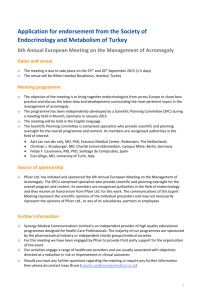
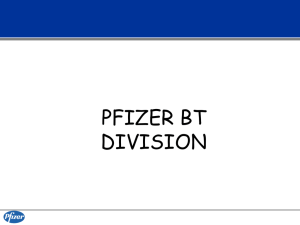
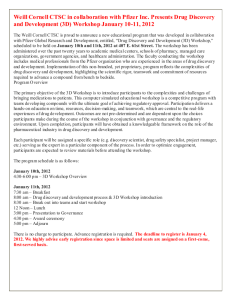
![-----Original Message----- From: Yates, William O. [ ]](http://s2.studylib.net/store/data/015588454_1-7c4ca8680529e74e412b8e161d2dab08-300x300.png)
